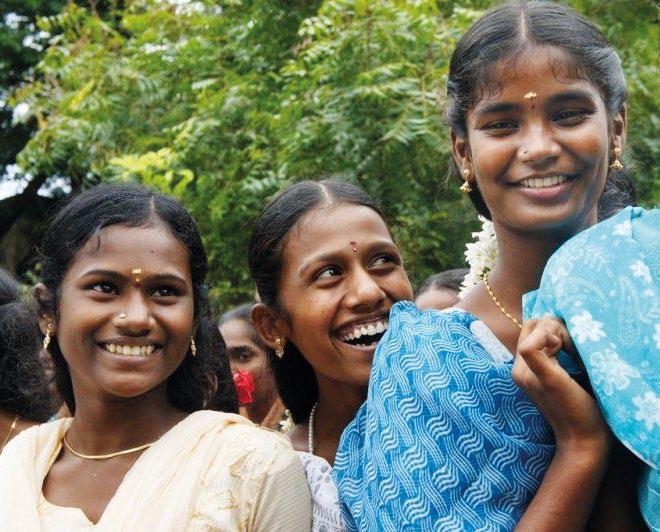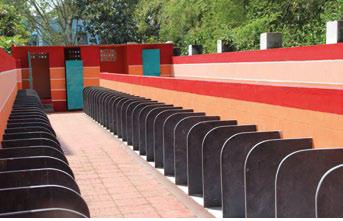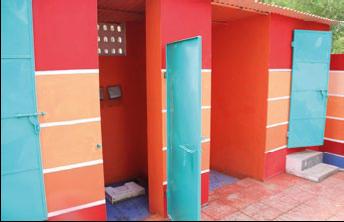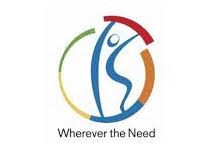Putting sanitation first - School sanitation story from India
Country: India
Contents
Improved sanitation facilities keep girls in school
Basic data:
Wherever the Need completed a new eco-sanitation block for the girls at the at Chandra Girl’s School in Tamil Nadu. 1300 female students and their teachers benefit from the new sanitation facilities at this school but the NGO runs several more school toilet projects in the region.
The project and the experiences:
Students and teachers at Chandra Girl’s School in Tamil Nadu used to have no other option than to use the nearby wasteland as a toilet. The health and safety of the girls and school staff suffered under dreadful circumstances as diarrhoeal diseases easily spread, and the girls were also at risk of getting attacked while looking for a secret place to urinate or defecate. “We used to go at least in pairs because we felt much safer then,” Prianga says.
Her friend K. Arthi from 9th standard adds, “I know the problem of lacking toilet facilities was more serious for the grown up girls who had to change their napkins. It was almost impossible for them to do it in the small toilet and in the crowded atmosphere. Because of this, many girls used to take leave and lose classes during menstruation. Some girls who used sanitary towels could not wash nor change their sanitary towels. They often felt embarrassed and started crying if they stained their dress.”
That began to change in March 2012 when Wherever the Need completed a new eco-sanitation block for the girls at the school. Maharunisha relates her experiences: “I am from a very orthodox Muslim family studying 9th standard here. My parents were never happy that I went to the river side and did not follow the custom of washing after every pee. They asked me to come home every time I am in need of using a toilet. Since my house is about a kilometre away, it was impossible to manage going home and back to school with the interval time. When I reached puberty, I was asked to stop my studies by my parents. After I told them about the newly built sanitary block and brought them to the school to see it themselves, they have allowed me to continue my studies.”
During the first four months after completion of the new toilets, school enrollment increased by 7% and attendance by 15%, and the incidence of illness has also declined. The topic of menstruation remains taboo in India, but since a hygiene education program started at the school, the attitudes of many have changed. “We have been providing sanitary napkins for a long time. But since we started conducting hygiene awareness courses, which also included menstrual hygiene, the sale of sanitary napkins increased significantly. We used to sell 20 pads a day, now we sell 140,” says Vanden Bowen from the local NGO Wherever the Need. Use of sanitary napkins is important because if they are not available, girls may use dirty cloths and rags which can lead to infection.“We are very satisfied with the improvement due to the project. Some of the girls now stockpile sanitary napkins before school holidays to make sure that they do not run out of adequate hygiene articles while the school shop is closed,” adds S. Paramasivan.
“With the experience of comfort in using the sanitary pads, I spoke to my two sisters and they are also now using pads, which I buy from the school. I know that many girls like me are buying pads for their mother and sisters at home. One can see the sanitary napkin pads are now in sale in the shop we have at the village,” says K. Arthi.
During the planning process, UDDTs were selected as the key sanitation technology, but that alone was not enough as Vanden explains: “As it was a girls’ school, we paid more attention to the gender aspects. We also built an incinerator for the safe disposal of economically Viable: used sanitary napkins.” K. Arthi adds: “The change closing the loop by of pads become much easier with the wash room collecting and reuse fitted with an incinerator. The Ayyah who is engaged urine and faeces protects in cleaning the sanitary block regularly burns the environment and finances disposed pads.” The Ayyah is a woman from the nearby village who is responsible for the daily maintenance and the cleanliness of the sanitary block. The Parents-Teacher-Association covers her salary as well as other operating costs.
Wherever the Need also recognises the valuable nature of the urine and faeces collected by the ecological toilets, and therefore collects the output of the toilets. Vanden describes the process: “We are running several projects in the region and home villages. we are well appointed with necessary equipment. It is easier and eco-friendlier to do the collection and distribution of the output in a centralized way than to force schools to invest, for example, in trucks. Meanwhile, we are regularly able to check the facilities and do maintenance work if necessary.”
The eventual sale of the urine and faeces also provides the project financial security. “The income we generate from the sale of the compost is sufficient to cover the associated maintenance and running costs each year. The necessity of maintenance deviates from each school. If they had to bear the costs for themselves it would not always be possible to do the required repairs. But as we are saving the income from all schools, the costs and incomes evens out.”
The key lessons of the story
Vanden identified timing the behaviour change perfectly as one of the most important lessons learned.“When we started building the sanitary facilities we realised that the girls were very open and interested in the new technology. They were curious themselves and did not need motivation from external factors. We used this moment to educate them about sanitation, health and hygiene behaviour.” Parents, through the school, are also very aware of the project and its benefits and now wish to get ecological toilets as well. Two students, Prianga and Jayaputhradevi, campaigned for eco-toilets in Anaivari, their home village. Inspired by this story, two private donors from the United Kingdom have recently funded the construction of an eco-toilet block at Anaivari Primary School.
Contribution to the SuSanA sustainability criteria
Socially Acceptable and Institutionally Appropriate: Improved sanitation facilities convince families to allow girls to continue their education even after puberty.
Protect the Environment and Natural Resources & be Financially and Economically Viable: Closing the loop by collecting and reuse urine and faeces protects environment and finances O&M of the toilets.
Promote Health and Hygiene Effectively: Hygiene education classes help to break taboos and encourage girls to campaign for greater investment in sanitation facilities in their home villages.
Project details:
Project location: Chandra Girl's School in Tamil Nadu, India
Executing institution and funder: Wherever the Need British NGO
Project partners: WECF
Wherever the Need has been operating since 1997 as an international development charity, working closely with communities to build sustainable futures in some of the poorest parts of the world. Their focus is the provision of eco-sanitation and clean water, understanding that this is the key to improved health that, in turn, unlocks opportunities and potential for individuals. Since 2005 Wherever the Need has changed the lives of over 50,000 people, mainly in India and Sierra Leone.
WEC (Women in Europe for a Common Future) is a non-governmental organization established in 1994 following the 1992 Earth Summit in Rio de Janeiro, to give women a stronger voice in the field of sustainable development and environment. WECF strives for balancing the environment, health and economy, taking the different needs and perspectives of women and men into account and implements solutions locally and influences policy internationally.
Contact
Vanden Bowen
Wherever the Need
vanden![]() wherevertheneed.org.uk
wherevertheneed.org.uk
wherevertheneed.org.uk/projects/




